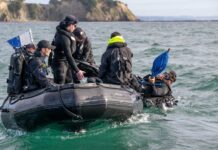The government’s plans for a recreational fishing park in the Hauraki Gulf are “reckless”, says Friends of the Hauraki Gulf.
“The crisis facing the gulf was caused by over-fishing. The solution does not lie in allowing more fishing,” the Waiheke group states in its submission to the government on its proposed Marine Protected Areas Act.
The group calls for marine reserves to be established to stop the decimation of fish and seabird species and the decline of the marine environment in the gulf.
“There is widespread consensus among marine biologists that for the Hauraki Gulf to have a chance of recovering its biodiversity, a minimum of 10% of the gulf should be preserved in a network of marine reserves,” the submission states.
The idea of a fishing park stretching from Coromandel to Leigh would be “absurd if transposed into a terrestrial conservation context,” the group says.
“Would we consider hunting of New Zealand native land species across the entire Auckland isthmus?”
The continued commercial fishing of some species in the proposed recreational fishing park is also “nonsensical and ill-conceived”, according to Friends of the Hauraki Gulf.
“The needs of our grandchildren, and theirs, are not being properly addressed in this short-sighted approach to conservation, which is biased towards extractive activities.
“The expectations of recreational fishers, a minority sector of the current population, should not jeopardise the quality of life of future generations of New Zealanders,” the submission states.
The group supports recreational fishers being required to record their catches and a licensing system for fishers.
Hauraki Gulf Conservation Trust has also filed a submission on the proposed act, stating that influential New Zealand marine biologist Bill Ballantine lobbied for 30% of the marine environment to be protected to reverse the impacts of over-fishing.
“Scientific research shows that marine ecosystems are under threat all around the world and that here in New Zealand we have way too small a portion of our marine environment protected.
“We are totally opposed to the concept of a ‘recreational fishing reserve’ and the institutionalisation of this exploitative and damaging activity, particularly in the Hauraki Gulf where the recreational take is larger than the commercial take, and both need to be restricted,” the trust states in its submission.
Keep Our Beaches, the Waiheke group that has opposed marine reserves on the island’s popular eastern beaches, did not make a submission on the proposed act.
Spokesperson Deb Cox says the group is generally supportive of the range of protections that would be available under the proposed new act. • Rose Davis







